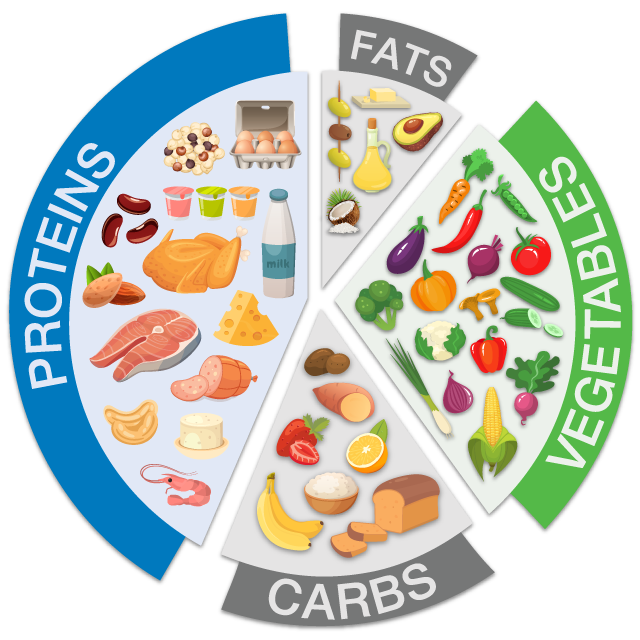
Balanced Eating, Not Cutting Food Groups, is the Key to Sustainable Weight Loss
The GOLO for Life Plan emphasizes eating balanced meals consisting of nutritious, ‘real’ food. This means portioning your plate with the correct balance of protein, fruits and vegetables, whole grains, and healthy fats.
Eating whole foods and eliminating or limiting processed foods from your diet can help you achieve steady, lasting weight loss while fueling your body with the antioxidants, fiber, and nutrients you need to look and feel your best.
And it All Starts with Creating Balanced Meals!
Many weight loss plans lead you to believe that drastically cutting carbs and eliminating fat from your diet will help you lose weight faster. While it's true that you can experience rapid weight loss by significantly reducing your calorie intake, if you lose weight too fast (more than 1-2 lbs. per week), your body will start breaking down muscle tissue to use for energy.
Not only is rapid weight loss generally not sustainable long term, but any time you increase your calorie intake, the muscle you burned will come back as fat, causing you will regain the weight you lost!
This is why the GOLO for Life Plan advises against skipping food groups. Your body needs healthy carbs and fats for sustainable energy and steady, lasting weight loss.
Why Your Body Needs Healthy Carbohydrates

Weight loss programs that suggest reducing or eliminating carbs from your diet aren't telling the whole story. The key is knowing which ones are healthy and which ones to avoid.
Healthy carbohydrates like fruits, vegetables, grains, beans, whole wheat pasta, and rice are nutrient-dense, digest slowly to help you feel fuller longer, and are also high in fiber, which is essential for digestive health. They are also a more stable energy source than unhealthy processed carbohydrates.
Carbs are your brain’s preferred source of energy. If you've ever reduced or cut carbs from your diet, you’ve likely experienced what is known in diet circles as 'brain fog'. When this happens, many people notice that they end up craving more carbs than they did previously. This is another reason why low- or no-carb diets are hard to stick with long term.
Carbohydrates also provide your body with the quickest form of energy. If you’ve integrated physical activity into your weight loss plan, it’s important to have this readily available energy for your body to access and burn when you’re active.
Processed, or 'simple,' carbohydrates, such as bread or pasta made from white flour; and sugary or processed snacks, can drive up insulin levels in the body and lead to weight gain. They tend to be easy to get, come in large portions, taste good, aren't too filling, and contain "empty calories" that provide no nutrients.
Eating more whole or complex carbs in the proper balance with protein, vegetables and healthy fats is the key to long-term weight loss.
Why You Shouldn't Cut Fat From Your Diet

Contrary to popular belief, fat is essential to good health and should not be cut from your diet completely. Fat helps your body absorb nutrients, provides energy, aids in proper cell growth, and supports brain health.
But Not All Fat is Created Equal
Generally speaking, there are four primary dietary fats: Trans fats, saturated fats, monounsaturated fats, and polyunsaturated fats.
Trans fats are the least healthy fat and are commonly found in fried foods and baked goods. As of 2018, artificial trans fats have been banned in the U.S. by the Food and Drug Administration.
Saturated fats occur naturally in red meat and dairy products but are more significant in fried, processed, and packaged foods.
Red meat and dairy can be part of a healthy diet, but it is good to keep in mind that they do have saturated fats so make sure to alternate how often you eat these items to see the best weight loss results. It is best to try to avoid saturated fats from processed foods.
Unsaturated fats (polyunsaturated and monounsaturated fats) commonly found in vegetables, nuts, seeds, fish, avocados, and olive oil, are considered healthy fats.
These types of fats provide the macronutrients required for your body to function at an optimum level, promote heart health, and play an important role in controlling weight. This is why it is an essential part of the GOLO for Life Plan.
Why GOLO Emphasizes Balanced Meals

By creating meals based on your GOLO Smart Card, you will fill up on lean proteins, carbohydrates, vegetables, and healthy fats to help you lose weight and create a healthy lifestyle without cutting calories, skipping food groups, or relying on unhealthy, processed diet foods.
Sources
Information for this article was collected by the health and wellness experts at GOLO using the following sources:
Harvard Health
GOLO is not intended to diagnose, treat, prevent or cure any illness or disease. This blog provides general information and discussion about health and wellness related subjects. The words and other content provided in this blog, and in any linked materials, are not intended and should not be construed as medical advice. GOLO encourages you to consult a doctor before making any health changes, especially any changes related to a specific diagnosis or condition. All opinions and articles linked to and from this page are those of the individuals concerned and do not necessarily represent those of GOLO, LLC or its employees. No responsibility can be accepted for any action you take or refrain from taking as a result of viewing this page. GOLO will not be liable for any errors, losses, injuries, or damages from the display or use of this information. These terms and conditions are subject to change without notice.
Tagged with: Food, Healthy Living